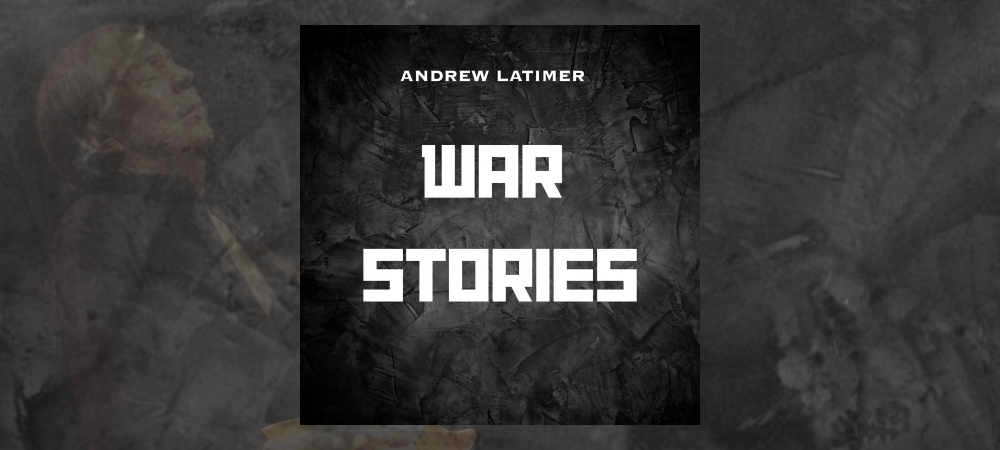Twenty-three years have passed since the release of A Nod and a Wink. In the intervening decades, speculation and conjecture over whether – or even if – we would ever hear new music again from Andrew Latimer has fuelled endless discussions and forums. Then, with little fanfare, War Stories appears out of nowhere on his Bandcamp page. My god. Is it true? He’s back!
However, when War Stories begins, it becomes clear this 48-minute suite represents something far more profound than a simple ‘return’. Throughout his career, Latimer has given musical voice to the human cost of separation and conflict: the divided Berlin of Stationary Traveller, the isolated soldier of Nude, families torn apart by emigration in Harbour of Tears, and the forsaken struggle to survive and belong permeating Dust and Dreams.
Now, with collaborators spanning decades (Guy LeBlanc, who passed away in 2015, playing alongside Pete Jones, the man who would replace him on Camel’s touring schedule), War Stories emerges as the work where all these threads converge – a lifetime’s meditation on endurance, upheaval, displacement, and the long journey home.
Dedicated to “those with passion, strength and courage who are forced to endure conflict,” War Stories unfolds as a single 48-minute suite divided into fourteen titled sections. The journey on which we are being taken is clearly mapped: from “Home” through gathering storms, Winds of Change, darkness, prayer, Lost for Words, and ultimately back to Going Home.
This isn’t an album of separate tracks but a continuous evolving narrative where one moment flows organically into the next, forcing us to experience the journey as Latimer conceives it. It’s predominantly instrumental, with Pete Jones contributing vocals and saxophone on two sections: In the Dark and the devastating final movement, where his voice finally gives words to what the guitar has been wrestling to express at each stage of the path we have taken.
From the opening moments of Home, Latimer’s guitar weaves an alluring, mesmerising spell which captures our attention. The profound range of expressiveness, the way he varies pressure on the strings to create an entire emotional vocabulary without words, is exquisite. There’s a maturity and a wisdom at work here, a finely nuanced restraint forged through decades of contemplation and willingness to experiment. He’s not revelling in technical prowess; he’s striving to capture something larger: a story which revolves around our need to belong, the resilience of which we seem unfathomably capable, the pain of uprootedness, the isolation of loneliness, unfamiliarity, and the aching need which burns in the hearts of all of us to find our way back. Latimer’s signature motivation is always the need to come home.
As the suite progresses, we move through emotional terrains which evoke feelings that are both universal and yet also deeply personal. By the time we reach We are One, the choral segment evokes the Christmas Truce, enemies singing across battlefields, finding shared humanity in the midst of horror. It flows into Belief, where we encounter the Latimer we’ve always known: those distinctive chord progressions, the sensitivity and delicacy crafting emotionally resonant soundscapes.
But it’s in Waiting and Lost for Words where the suite’s heart reveals itself most powerfully. Mournful, reflective, haunting, Latimer uses echoed instrumentation to convey a sense of troubled presence and profound uncertainty. Distant rumblings punctuate anxious silences. A strong single-note guitar voice emerges over delicate keys and light drum rhythms, staccato phrasing opening into meandering journeys – wistful but intent, purposeful yet lacking direction. Hope presides over uncertainty. Then, carried on the wind, a whisper: “reaching out to me.” Indistinct, beautiful, forlorn. The solitary call of an owl carries across the darkness.
The Cellist introduces something unexpected: a piano accompanying what sounds like a cello (though it may be cello-toned synth), weaving in and out of the soundscape, sometimes accompanying, sometimes interjecting. A choral interlude adds new texture. This intimate passage feels like a moment of individual humanity breaking through the larger narrative of conflict: one voice, one story within countless stories, of millions of lives forever changed beyond comprehension.
What follows has echoes of Dust and Dreams – the cello voice is replaced by a cello-toned guitar, growing and developing its own distinctive sound, swelling and dancing on musical tides and eddies. A menacing presence emerges, then gives way to a contrasting guitar voice, deliberately higher in key with echoing drums. It’s light but insistent, purposeful yet still searching for something. As the crescendo builds, the soundscape shifts to piano-led passages with stringed accompaniment playing short, precise, supportive chords.
Then comes the moment of transformation. The guitar returns – but this time it’s imperious, insistent, commanding. It has found what it was looking for. There’s a sense of certainty now, a new and rising confidence of finding its way home. A cascading drum marks the transition, an almost tribal beat setting the tone for what follows. Earlier themes return, assertive and purposeful yet playful and inquisitive, quietly determined.
What is remarkable throughout is Latimer’s supreme restraint. The album feels carefully tempered, lovingly controlled, patiently caressed, but in ways which contribute to the atmosphere and emotion of the moment. He’s keeping it simple. Less is more. When he does let loose at around the 37-minute mark, building up a head of steam with flashes of depth and intensity, it matters precisely because of this passage of sustained restraint. All instruments converge into a single theme, a unified direction. We hear sounds of crowds, thunder pealing across the sky, and lightning flashing. The guitar re-establishes itself with a sense of unity, of hope, comfort, safety, and security.
And then comes Going Home. Light piano and Pete Jones’s poignant vocal asking the question which breaks your heart: ‘When can we go home?’ followed by the answered prayer: ‘We’re going home again, where we belong.’
The guitar becomes utterly transcendent. It moves you to tears, profound, resonant, coming from deep within the soul. This is music emerging from longing and desire, from things that should never have been seen, set in contrast to things yearned for in memory. Now it’s happening. We’re going home. The guitar leads the way through Jones’s devastating lyric ‘all we left behind,’ and it breaks you emotionally, in the best possible way. You feel the joy and the exhaustion simultaneously. The relief and the cost. You’re not just listening to someone’s journey home, you’re with them, feeling exactly what they’re feeling as the choral voices return to echo that hard-won sentiment.
After forty-eight minutes, after a lifetime of wrestling with themes of displacement, separation and conflict, Latimer has brought us home. But this is not the home we started from. We’ve been changed by the journey he has taken us on, by the emotional terrain he’s guided us through. We come home to a place of earned peace. The weight of what he has conveyed, the struggle, the longing, the cost, will stay with us forever. These are people who have seen things no human being should ever have witnessed. But coming home offers a sense of resolution, hard-won, deserved, and almost satisfying.
War Stories isn’t just Latimer’s return to recording. It feels like his almost definitive statement on what it means to endure, to survive separation, and to find your way back, finally. In many ways, it is the work he’s been composing his entire life. For me, it stands as one of progressive rock’s most profoundly moving achievements.
TRACK LISTING
War Stories
– Home
– The Beating Heart
– Winds Of Change
– Before the storm
– In The Dark
– A Prayer
– We Are One
– Belief
– Waiting
– Lost For words
– The Cellist
– The Phoenix
– Long Road Ahead
– Going Home
Total Time – 48:34
MUSICIANS
Andrew Latimer – All Instruments
Pete Jones – Vocals, Saxophone (In The Dark and Going Home)
Guy Leblanc – Piano, Bass, Drums (Going Home)
ADDITIONAL INFO
Record Label: Independent
Country of Origin: UK
Date of Release: 1st October 2025
LINKS
Andrew Latimer (Camel) – Website | Facebook | Bandcamp | YouTube | X






